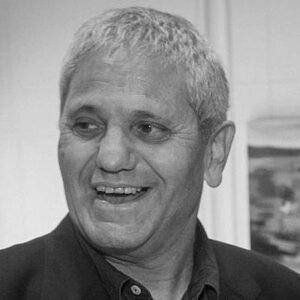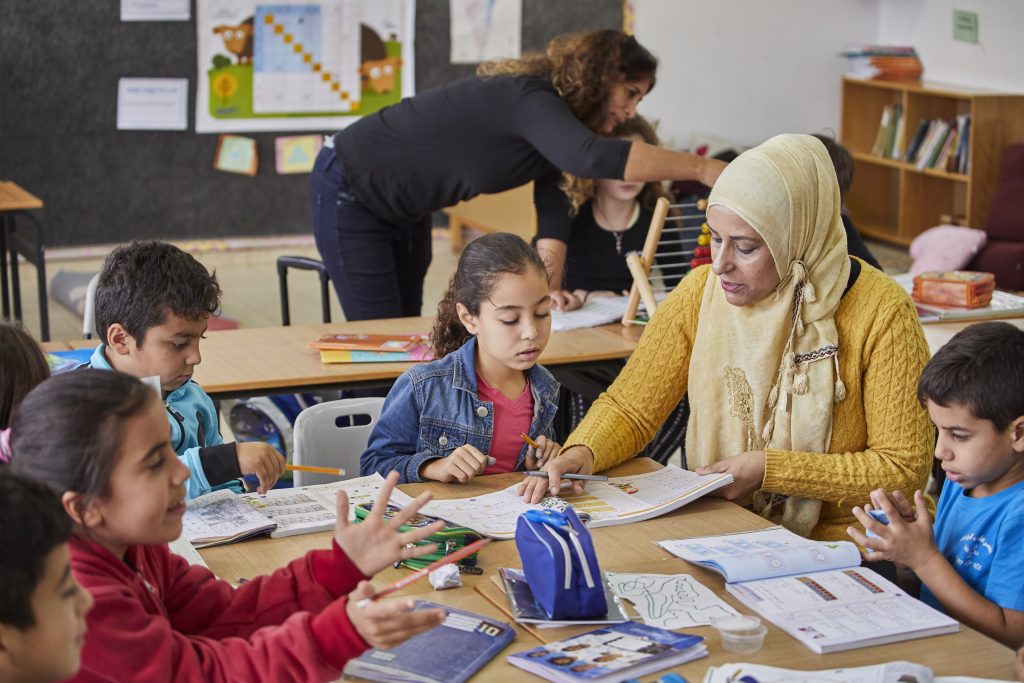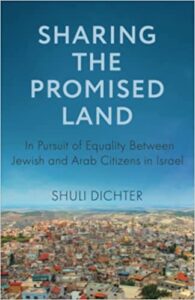- About Us
- Policy Center
- Learn
- Press Room
- Blog
- Get Involved
- Donate
- Donate to J Street Online
- Make a Gift in Someone’s Honor or Memory
- Make a Monthly Gift
- Tax-Deductible Donations
- Giving by mail

As we approach Israel’s 75th anniversary, in the midst of a constitutional crisis that is shaking the nation, we sat down with Shuli Dichter, lifelong Israeli activist, to discuss his work, his hopes for the future, and what he sees as the most significant challenges to his vision.
Shuli Dichter’s start in coexistence activism began at a young age. In 1972, as a high schooler, Dichter organized groups of Jews and Arabs to engage in dialogue.
Later he led central NGOs promoting equality and Jewish-Arab shared society. In his book Sharing the Promised Land, recently published in English, he reflects on his journey through a series of stories and essays.
Shuli Dichter grew up on Kibbutz Ma’anit, just south of Haifa in the North of Israel. Dichter explains in his book Sharing the Promised Land that the move to settle on the land of Kibbutz Ma’anit was “the first insertion of a needle into the Jewish seam stitching a connection to the hills of Samaria.” Throughout his childhood, an invisible wall was built between them and their immediate Arab neighbors.
“I am a Zionist, as I believe whole-heartedly in the Jewish people’s right to self-realization as a collective in the Land of Israel,” says Dichter. “As such, I personally am a part of the problem between Jews and Arabs – and there is no way to avoid that.”
“My path began, like for many others around me, with an optimistic aspiration for coexistence with the Arabs,” Dichter explains. In his first job as an Arabic teacher, he frequently spoke to his students about the need to live peacefully alongside one another.
But as he continued in his career, he realized that he had been disregarding the massive power structures at play between Jews and Arab citizens of Israel. This was when he began to go beyond just a baseline understanding of coexistence – and started his life’s work for egalitarianism.
“I often get asked how I can believe in a true egalitarian partnership with Palestinian citizens of Israel while also defining myself as a Zionist,” Dichter notes.
After a transformative experience in Toronto as a Shaliach (an Israeli community member sent to the diaspora for Israel education), Dichter returned to Israel to become the director of Children Teaching Children – a program of Givat Haviva, bringing Jewish and Arab students together for weekly joint learning.
“The actual breakthrough in my understanding of relations between Jewish and Arab citizens was only then, in the mid-90s,” tells Dichter. “When the Arab staff members demanded that the program be co-directed by both a Jew and a Palestinian. Only then did I go from being a nice and welcoming boss to a true partner.”
In 1998, Dichter became the CEO of Sikkuy-Aufoq – a leading advocacy NGO that promotes equality between Jewish and Arab citizens of Israel, with major achievements in policy change vis-à-vis the government and changing the discourse in the media. Twelve years later, he became the CEO of Hand in Hand, doubling the number of integrated, bilingual schools for Jewish and Arab children in Israel.

Nowadays, at The Van Leer Jerusalem Institute, alongside an Arab partner Ameer Fakhoury, Dichter is founding the NISAN Center for Research on Shared Society. NISAN’s first project will be to write the first lexicon on Shared Society in Israel. It will include 35 terms, written by leaders of major organizations in the field and edited by Dichter and Fakhoury.
“We hope to launch the first edition during 2023,” says Dichter. “In the midst of today’s politically dangerous storm, we are fixing a compass that will show a clear vision of the desired future.”
Reflecting on what it means for the State of Israel to turn 75 at this pivotal moment in the country’s history, when tens of thousands of Israelis are going out to the street week after week to show their opposition to Netanyahu’s far-right government, Dichter tells J Street about a sign he saw at a demonstration in Tel Aviv that struck a chord with him. It read: “There was never a real democracy here…And we are going to miss it dearly.”
“Arab citizens of Israel often mock the depiction of Israel as ‘Jewish and democratic’ by bitterly noting that it is democratic for the Jews and Jewish for the Arabs. That’s been the truth for a few decades. But we have a vital role to play and bear responsibility. I’m a Zionist, and I believe the Jewish people have a right to collective Jewish life in the Land of Israel. And I’ve come to understand that Zionism can only prevail in equal partnership with the Palestinians. This land must be shared by both.”
 Dichter’s definition of Zionism is explained in Sharing the Promised Land as Civic Zionism.
Dichter’s definition of Zionism is explained in Sharing the Promised Land as Civic Zionism.
“Civil society in Israel has come a long way in the past 20 years. The community has established dozens of Jewish-Arab partnerships from bilingual schools, to joint advocacy NGOs, to women’s organizations, and other ‘islands of shared society,’” Dichter says. A year ago, he tried counting how many people in Israel were directly involved in these organizations. He stopped counting when he reached 74,000 people actively engaged in shared civil society.
“Shared society is a very strong goal, that many of us are determined to attain. As Israel turns 75, in the shadow of the crisis, this fact gives me optimism for its future.”